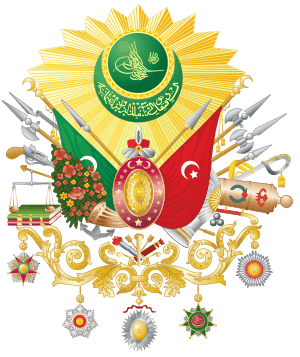Hibetullah Sultan
Hibetullah Sultan (Ottoman Turkish: هبت الله سلطان; 16 March 1789 – 18 September 1841) was an Ottoman princess, the daughter of Sultan Abdul Hamid I, and his wife Şebsefa Kadın. She was the half sister of Sultans Mustafa IV and Mahmud II.
| Hibetullah Sultan | |
|---|---|
| Born | 16 March 1789 Topkapı Palace, Constantinople, Ottoman Empire (now Istanbul, Turkey) |
| Died | 18 September 1841 (aged 52) Kadırga Palace, Istanbul, Ottoman Empire |
| Burial | |
| Spouse | Alaeddin Pasha
( m. 1801; died 1812) |
| Dynasty | Ottoman |
| Father | Abdul Hamid I |
| Mother | Şebsefa Kadın |
| Religion | Sunni Islam |
Early life
Hibetullah Sultan was born on 16 March 1789 in the Topkapı Palace. Her father was Sultan Abdul Hamid I, and her mother was Şebsefa Kadın. She was the youngest child of her parents. She had a brother Şehzade Mehmed Nusret, [1] six years elder then her, two sisters, Alemşah Sultan,[2] four years elder then her, and Emine Sultan, one year elder then her.[1] After her father's death in 1789, she and her mother settled in the Old Palace.[3][4]
Marriage
In 1801, when Hibetullah was twelve years old, her cousin Sultan Selim III betrothed her to Alaeddin Pasha, the son of Damad Seyyid Ahmed Pasha.[3][4] The marriage took place on 30 January 1803. The couple were given Kadırga Palace as their residence.[3]
In 1808, after the dethronement of her elder half-brother Sultan Mustafa IV, Hibetullah Sultan and her elder half-sister Esma Sultan, who were involved in state affairs, were kept under close surveillance by Sultan Mahmud II, and were forbade to make communications with outsiders.[3]
Hibetullah remained childless. She was widowed at Alaeddin Pasha's death in 1812. She was twenty three years old.[3] Like the princesses of her generation she didn’t remarried.
After the death of her mother, all her çiftlıks of her mother were assigned to Hibetullah Sultan.[5][6]
Death
Hibetullah Sultan died on 18 September 1841 in the Kadırga Palace which was the palace of her aunt Esma Sultan, and was buried in the mausoleum of her brother Sultan Mahmud II, Divanyolu, Istanbul.[7][4]
Ancestry
| Ancestors of Hibetullah Sultan | |||||||||||||||||||||||||||||||||||||||||||||||||||||||||||||||||||||||||||||||||||||||||||||||||||||||||||||||||||||||||||||||||||||||||||||||||||||||||||||||||||||||||||||||||||||||||||||||||||||||||||||||||||||||||||||||||||||||||||||||||||||||||||||||||||||||||||||||||||||||||||||||||||||||||||||||||||||||||||||||||||||||||||||||||||||||||||||||||||||||||||||||||||||||||||||||||||||||||||||||||||||||||||||||||||||||||||||||||||||||||||||||||||||||||||||||||||
|---|---|---|---|---|---|---|---|---|---|---|---|---|---|---|---|---|---|---|---|---|---|---|---|---|---|---|---|---|---|---|---|---|---|---|---|---|---|---|---|---|---|---|---|---|---|---|---|---|---|---|---|---|---|---|---|---|---|---|---|---|---|---|---|---|---|---|---|---|---|---|---|---|---|---|---|---|---|---|---|---|---|---|---|---|---|---|---|---|---|---|---|---|---|---|---|---|---|---|---|---|---|---|---|---|---|---|---|---|---|---|---|---|---|---|---|---|---|---|---|---|---|---|---|---|---|---|---|---|---|---|---|---|---|---|---|---|---|---|---|---|---|---|---|---|---|---|---|---|---|---|---|---|---|---|---|---|---|---|---|---|---|---|---|---|---|---|---|---|---|---|---|---|---|---|---|---|---|---|---|---|---|---|---|---|---|---|---|---|---|---|---|---|---|---|---|---|---|---|---|---|---|---|---|---|---|---|---|---|---|---|---|---|---|---|---|---|---|---|---|---|---|---|---|---|---|---|---|---|---|---|---|---|---|---|---|---|---|---|---|---|---|---|---|---|---|---|---|---|---|---|---|---|---|---|---|---|---|---|---|---|---|---|---|---|---|---|---|---|---|---|---|---|---|---|---|---|---|---|---|---|---|---|---|---|---|---|---|---|---|---|---|---|---|---|---|---|---|---|---|---|---|---|---|---|---|---|---|---|---|---|---|---|---|---|---|---|---|---|---|---|---|---|---|---|---|---|---|---|---|---|---|---|---|---|---|---|---|---|---|---|---|---|---|---|---|---|---|---|---|---|---|---|---|---|---|---|---|---|---|---|---|---|---|---|---|---|---|---|---|---|---|---|---|---|---|---|---|---|---|---|---|---|---|---|---|---|---|---|---|---|---|---|---|---|---|---|---|---|---|---|---|---|---|---|---|---|---|---|---|---|---|---|---|---|---|---|---|---|---|---|---|---|---|---|---|---|---|---|---|---|---|---|---|---|---|---|---|---|---|---|---|---|---|---|---|---|---|---|---|---|---|---|---|---|---|---|---|---|---|---|---|---|---|---|---|---|---|
| |||||||||||||||||||||||||||||||||||||||||||||||||||||||||||||||||||||||||||||||||||||||||||||||||||||||||||||||||||||||||||||||||||||||||||||||||||||||||||||||||||||||||||||||||||||||||||||||||||||||||||||||||||||||||||||||||||||||||||||||||||||||||||||||||||||||||||||||||||||||||||||||||||||||||||||||||||||||||||||||||||||||||||||||||||||||||||||||||||||||||||||||||||||||||||||||||||||||||||||||||||||||||||||||||||||||||||||||||||||||||||||||||||||||||||||||||||
References
- Sarıcaoğlu, Fikret (1997). Hatt-ı Humayunlarına göre Bir Padişah'ın Portresi: Sultan I. Abdülhamid (1774-1789). pp. 14, 16.
- Sakaoğlu 2008, p. 511.
- Sakaoğlu 2008, p. 507.
- Uluçay 2011, p. 170.
- Uluçay 2011, p. 164.
- Sakaoğlu 2008, p. 499.
- Sakaoğlu 2008, p. 507-8.
Sources
- Uluçay, Mustafa Çağatay (2011). Padişahların kadınları ve kızları. Ankara, Ötüken.
- Sakaoğlu, Necdet (2008). Bu mülkün kadın sultanları: Vâlide sultanlar, hâtunlar, hasekiler, kadınefendiler, sultanefendiler. Oğlak Yayıncılık. ISBN 978-9-753-29623-6.
